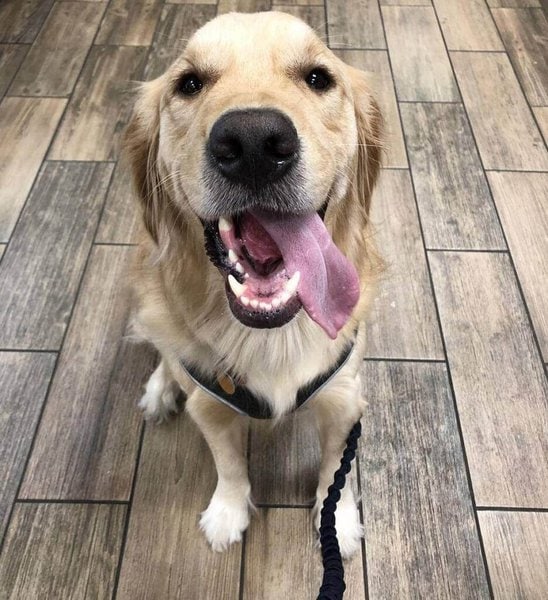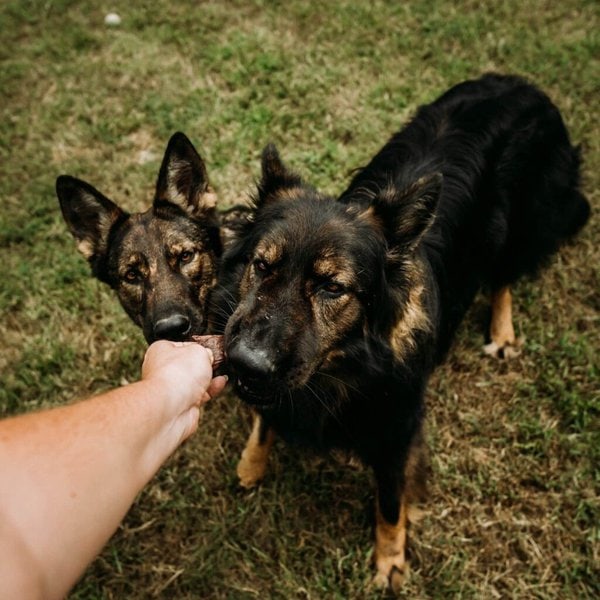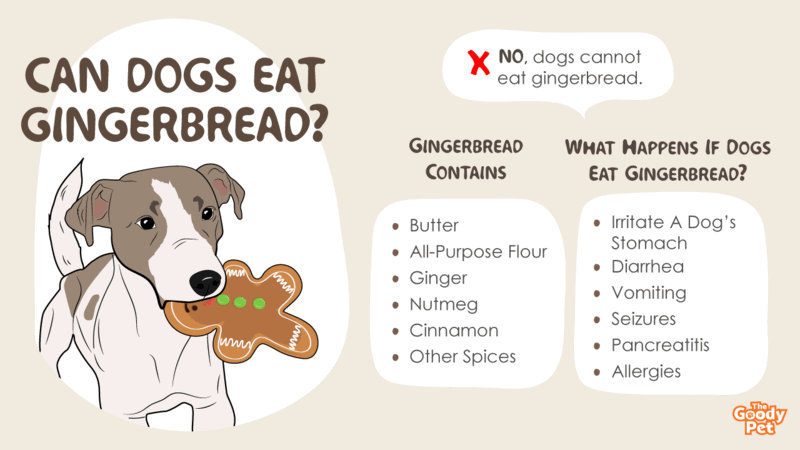Dogs and gingerbread cookies might seem like an odd pairing, but many pet owners are curious if it’s safe to give their furry friends a taste of the holiday treat.
Dogs cannot eat gingerbread because of the potential health risks associated with ingesting some of the ingredients in gingerbread, as well as for safety reasons. For example, gingerbread contains spices such as Nutmeg that can irritate a dog’s stomach and cause digestive problems such as diarrhea or vomiting.
Additionally, gingerbread often contains molasses or other forms of sugar which can be harmful to dogs if eaten in large quantities.
Is It Safe For Dogs To Eat Gingerbread?

While a small amount of gingerbread may not bring immediate harm, regularly giving dogs gingerbread as treats can cause them to have stomach upsets or pancreatitis.
Gingerbread is a holiday treat that is usually made with ginger, cinnamon, cloves, nutmeg, cardamom, star anise, brown sugar, molasses, honey, or corn syrup. Let’s look at each of these ingredients to see how they could affect our dog’s health.
Sugar/Molasses
Gingerbread contains molasses, which is a sugar product that can be harmful to dogs if consumed in large quantities. Molasses are harmful to dogs because they can cause an upset stomach, diarrhea, and vomiting.
If your dog ingests a large amount of molasses, it could also lead to blood sugar problems and weight gain. So, it’s best to avoid giving your dog gingerbread cookies or any other food that contains molasses.
Butter
Butter is another main ingredient of this confection and is mostly made of saturated fats. It is not toxic to dogs but too much consumption can also lead to obesity and pancreatitis.
All-Purpose Flour
Wheat flour is usually used for gingerbread and for some dogs it can trigger some allergies especially if they are gluten intolerant. A better alternative is a gingerbread that has whole wheat flour which contains more protein, fiber, and antioxidants.
Ginger
This being a gingerbread, ginger is naturally one of the main ingredients. Ginger provides a slew of health benefits like anti-inflammation and anti-cancer properties due to a compound called gingerol.
The safe amount of ginger is based on the size of your pooch, which is roughly between ¼ and ¾ teaspoon of fresh ginger.
Nutmeg
Gingerbread contains nutmeg, cinnamon, and cloves, which combine to give it a warm, spicy flavor. It is often used in baking, as a filling for pies and cakes, or as a topping for ice cream.
Nutmeg contains a compound called myristicin, which can have severe effects on dogs if consumed in large quantities. It can cause nausea, vomiting, and even death. Depending on the size of your dog, just a teaspoon or two of nutmeg could be enough to make him very ill, so you should always avoid giving this spice to your pets.
Cinnamon
Cinnamon is a safe spice for dogs and is considered non-toxic. It is known to increase their energy and boost brain function. It also has anti-fungal properties that protect it from yeast infections.
When using cinnamon, it is recommended to use the Ceylon variety rather than the Cassia variety since the former contains less coumarin which promotes blood thinning.
Other Spices
Allspice and cloves are also two spices found in gingerbread. While they are used sparingly on gingerbread, they both contain the compound eugenol which is found to cause liver toxicity in cats.
Other ingredients found in some gingerbread recipes are star anise which is known to make dogs hyper.
What Should I Do If My Dog Eats Gingerbread?

The first thing to do is to observe and monitor your dog closely. Note down its change in behavior, pooping frequency, stool appearance, and if it has vomited. All these notes will point to the severity of nutmeg poisoning and how your dog is affected by it.
Nutmeg is the number one reason why your dog can’t eat gingerbread. The toxin, myristicin, would not likely cause serious poisoning if only small amounts were ingested, say, a small bite or two of gingerbread. This will only cause a mild stomach upset.
Apart from the quantity consumed, the size, health, and age of your dog also determine the level of tolerance your dog can handle. If you have, let’s say, a Shih Tzu, and it accidentally ate a whole bag of gingerbread cookies, you should quickly look for signs that it may have an adverse reaction to the cookie.
But, if you have a large Doberman that ingested a similar amount of gingerbread, its toxic reaction could probably only result in mild symptoms like vomiting or diarrhea.
The Signs Of Nutmeg Poisoning
It is important to learn about the possible effects of nutmeg on your dog so you could act quickly to minimize the damage. Give your dog plenty of water if you think it is showing signs of poisoning to flush out the toxins.
If any of the following symptoms appear, it is best to visit your veterinarian immediately. Symptoms can last up to 48 hours if large amounts were ingested.
- Disorientation
- Increased heart rate
- Abdominal pain
- Dry mouth
- High blood pressure
- Seizures
How Can I Prevent My Dog From Eating Foods With Nutmeg?
The best way to prevent any accidental consumption of foods laden with ingredients toxic to dogs, such as gingerbread, chocolates, and fruits like strawberries or grapes, is to keep these foods in cabinets and out of the dogs’ reach.
It is also best to remind children and unsuspecting house guests to not share their food with your pooches without first checking with you. A lot of accidents happen when they are not aware that their friendly gesture may be causing harm to your pooch.
And of course, it is always better to just give your pooch dog treats that are made especially for dogs. This way, no amount of worries would trouble you later on.
What Are Some Of The Healthy Alternatives For Gingerbread?
If you want to give your dog that gingerbread treat, there are recipes you can find online to make your own homemade gingerbread cookie. A lot of the recipes call for healthy ingredients that would not harm your dogs like whole wheat flour or oat flour.
Plus, these recipes forgo any use of the dreaded nutmeg. Some also reduce or even leave out entirely the use of sugars to better protect your pooch from obesity and diabetes.
Can Dogs Eat Ginger Snaps?
It is OK to give your dog an occasional ginger snap treat. Giving them treats with a ginger flavor is perfectly fine since ginger is actually beneficial to them in small amounts.
It aids in digestion and prevents nausea. But, as with many commercially available cookies on the market, it contains a fair amount of sugars, fats, and salt. So, keep it to a minimum.

Is It OK To Give Chocolate-Flavored Gingerbread To My Dog?
No, you should never feed your dog chocolate-flavored gingerbread. Chocolate is one of the most toxic foods to feed your dog and can be life-threatening.
Chocolate also contains the compound theobromine which can cause seizures, muscle spasms, vomiting, and excessive urination. It has been reported that it takes about 2.25 oz or ¼ cup of baking chocolate to kill a 22-pound dog.
Are Sugar-Free Gingerbread Cookies Safe For Dogs?
No, gingerbread cookies are not safe. Many sugar-free cookies in the market contain the substance xylitol to substitute for sugar. Xylitol poisoning symptoms include a sudden sugar level drop, decreased activity, staggered walking, incoordination, liver failure, and seizures.
Xylitol is also found in some peanut butter products, candies, and other baked goodies. Always check the labels just to make sure.





